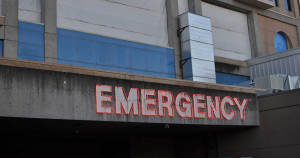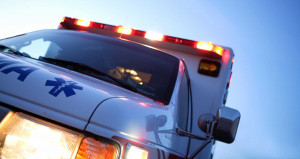JIBC works together with BC Health Authorities and BC Emergency Health Services using a provincial scheduling system to provide hospital and ambulance placements for paramedic students. Each year students are scheduled in approximately 7,000 practice placements across British Columbia.
Travel is often required to attend practice education placements. Placement shortages can occur and you may be required to travel to a different region where placements are available. Travel expenses are your responsibility as a student; please remember this when budgeting for your program. By remaining dynamic and able to travel, you will be best positioned to complete your program on time – along with getting a great variety of experiences.
Hospital Placements
 Students have the opportunity to apply and develop clinical and professional skills in the hospital setting. This will happen under the supervision of a nurse or physician, depending on your program. Students will be required to meet specific health authority pre-placement requirements in order to attend hospital placements, which will be tracked and monitored through each program.
Students have the opportunity to apply and develop clinical and professional skills in the hospital setting. This will happen under the supervision of a nurse or physician, depending on your program. Students will be required to meet specific health authority pre-placement requirements in order to attend hospital placements, which will be tracked and monitored through each program.
Ambulance Placements

Students have the opportunity to apply and develop clinical and professional skills in the ambulance setting. This will happen under the supervision of a paramedic preceptor. In addition to the health authority pre-placement requirements, students will also be required to meet specific BCEHS requirements in order to attend ambulance placements, which will be tracked and monitored through each program.
Monthly Practice Education Schedules
PHSA’s Preceptor Admin Team creates the regional ambulance placement schedules during the last week of each month for the following month. When JIBC’s Student Scheduling Team receives the regional ambulance placement schedules from Preceptor Admin, they copy the ambulance placement information for each student into the cohort schedules and then add the hospital placements. When the monthly practice education schedules are complete, they are emailed to students, sometimes with only a day or two notice for placements scheduled early in the month.
Decisions related to placement scheduling are ultimately the responsibility of your program staff and are based on educational requirements and placement availability. It is important that you remain flexible and available during the practice education portion of your program as changes to your schedule happen frequently and often at the last minute. Being available for practice education includes keeping yourself free of commitments and prioritizing practice education placements over work while you are a student.
| Course | Placements | Placement Time |
|---|---|---|
| Term 3 PARA-1116 |
2 Emergency Department | 16 hours |
| 16 Ambulance | 192 hours |
In the event that Emergency Department shifts are unavailable, students will be scheduled additional ambulance shifts as an alternative.
| Course | Placements | Placement Time |
|---|---|---|
| Term 1 PARA-3392 |
4 Ambulance Observation | 48 hours |
| 4 Operating Room 2 Emergency Department |
48 hours | |
| 16 Ambulance | 192 hours | |
| Term 2 PARA-3491A |
1 Emergency Physician 1 Pediatric 1 Obstetrics |
20 hours |
| 24 Ambulance | 288 hours | |
| Term 3 PARA-3492A |
1 Emergency Physician 1 Obstetrics 1 Neonatal 1 Pediatric |
28 hours |
| 28 Ambulance | 336 hours |
The Practice Education Experience
This video answers some common questions students may have around their placements including scheduling, supervision, safety, and compensation.
Are You Practice Education Ready?
All students participating in practice education placements in a BC Health Authority must complete mandatory prerequisites and orientation requirements. This video answers some common questions students may have about these requirements.
